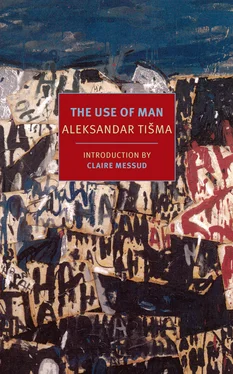Aleksandar Tišma - The Use of Man
Здесь есть возможность читать онлайн «Aleksandar Tišma - The Use of Man» весь текст электронной книги совершенно бесплатно (целиком полную версию без сокращений). В некоторых случаях можно слушать аудио, скачать через торрент в формате fb2 и присутствует краткое содержание. Год выпуска: 2014, Издательство: NYRB Classics, Жанр: Современная проза, на английском языке. Описание произведения, (предисловие) а так же отзывы посетителей доступны на портале библиотеки ЛибКат.
- Название:The Use of Man
- Автор:
- Издательство:NYRB Classics
- Жанр:
- Год:2014
- ISBN:нет данных
- Рейтинг книги:5 / 5. Голосов: 1
-
Избранное:Добавить в избранное
- Отзывы:
-
Ваша оценка:
- 100
- 1
- 2
- 3
- 4
- 5
The Use of Man: краткое содержание, описание и аннотация
Предлагаем к чтению аннотацию, описание, краткое содержание или предисловие (зависит от того, что написал сам автор книги «The Use of Man»). Если вы не нашли необходимую информацию о книге — напишите в комментариях, мы постараемся отыскать её.
A work of stark poetry and illimitable sadness,
is one of the great books of the 20th century.
The Use of Man — читать онлайн бесплатно полную книгу (весь текст) целиком
Ниже представлен текст книги, разбитый по страницам. Система сохранения места последней прочитанной страницы, позволяет с удобством читать онлайн бесплатно книгу «The Use of Man», без необходимости каждый раз заново искать на чём Вы остановились. Поставьте закладку, и сможете в любой момент перейти на страницу, на которой закончили чтение.
Интервал:
Закладка:
Gerhard had no liking for school, for work, for anything that achieved its goal through long-term effort. He accepted almost with relief this change, though for him it was a reversal, and he looked with mocking eyes at the spectacle of humiliating falls and arrogant promotions, sucking noisily through his teeth whenever he spoke of them. Measures that affected him directly, such as the summons to forced labor for all those in his age group, he simply ignored. “If anyone asks, I’m still in Belgrade,” he told his father, who tried to warn him, the day the notices were posted, of the dangers of failing to report. “But what if they see that you are here?” his father argued. “Tell them I just arrived and I’ll report tomorrow.” But that tomorrow never came, and while other young Jews pulled on their old clothes at the crack of dawn and hurried off, shivering, to the mustering points — to cart bricks, accompanied by blows and curses, all day long at the airport and to fill in craters made by German bombs — Gerhard stayed in bed, or loitered around the courtyard, or sat in the kitchen eating fruit from the basket the maid brought from the market, or vanished into the cellar with the neighbor’s wife, or read Hungarian and German detective novels, with which the newspaper kiosks were flooded. Kroner thought this behavior provocative; everyone could see Gerhard, including Count Armanyi, the store official, who often stood at the office window watching. But Reza would not agree to Gerhard’s remaining hidden in the house; the lack of sun and fresh air could harm his health. As for the regulations, announcements, and the threats they implied, she decided quite simply that they did not concern her son. She had agreed to let him accept the Jewish faith because at that time she believed that all Jews were wealthy, but now that the newspapers and the radio were accusing the Jews of being responsible for the war and the high prices, calling on Christians everywhere to help rid the land of them, she ceased considering him a Jew. Her own hatred of the Jews returned, especially after Sep’s visit, which reminded her of her past servitude to that race, a race alien to both of them, and had she been asked to give her opinion, she would certainly have approved of their extermination. And her son would have, too.
The more brutally the Jews were persecuted and the greater the humiliations they suffered, the more bitterly Gerhard despised them. It was as if he had made all the Christian prejudices his own, while still belonging to the Jewish faith. He would leer mockingly when a dusty column of civilians passed in the street, driven on by two soldiers, forced sometimes to march at double time and sing some nationalist Hungarian song, often anti-Semitic. He would imitate their unmilitary stride, their cowed stance, would pout to make his lips full, like theirs, and flare his nostrils to enlarge his nose. As few dared, particularly now that taunting carried the threat of real danger, of the deprivation of all one’s rights, he would say loudly, “Those Yids” or “Is he a Yid?” or “Are you a Yid?” to some unsuspecting fellow Jew, and the only reason he was not answered by a blow was that the butts of his mocking tongue were all too wretched, too frightened. It was this resignation that exasperated him.
He took a curious pleasure in studying the caricatures of Jews that appeared more and more frequently in the newspapers; the caricatures presented them as potbellied, hairy, thick-lipped, and having fleshy hooked noses, features that conjured up the vices of their race: greed and cunning. He could not stand the jokes that at that time the Jews were directing against themselves, for he was astute enough to understand that the purpose of that humor was to blunt the pain of reality. If anyone told him the kind of joke in which a Jew, in a situation of no escape, outwitted his enemy or found consolation in irony, Gerhard, instead of laughing, would say, in deadly earnest, “Yes, and then they grabbed hold of your Cohen and hung him on the nearest tree.” And only then would he bare his regular, white teeth: “Haha.”
Gerhard became so unpleasant that Jewish circles in Novi Sad spoke of him in indignant whispers. Some thought him mad; others said that he had joined the Gestapo, making good use of his half-German origin, and had been given the special job of demoralizing the Jews. They began to regard even Gerhard’s father with suspicion. Kroner’s relatively favorable position in the requisitioned store and his friendly footing with Count Armanyi suggested an accommodation with the Germans. And when it became known that Sep Lehnart was staying in the house, and when a bunch of old ladies on an afternoon visit to Grandmother Kroner came upon the young SS officer in the gateway, spick-and-span and about to go off into town, the disgust became total. Only the attempt on Sep’s life, had it been made, could have dispelled this suspicion. But Gerhard’s plans came to nought, and his associates, Franja Schlesinger and the Karaulić brothers, under the pressure of rumor and the disappointment of their failure, began to avoid him. This suited him well, because he did not have much confidence in them, particularly when their plan of escape by crossing over into Srem did not materialize. Now, left alone with his project, he could take action without having to worry about anyone else.
Like his uncle, he often went for long walks, but not in the center of town; instinctively, his wanderings took him to the remote streets on the outskirts. Those back streets, overgrown with grass and lined with squat, low houses, almost entirely inhabited by Serbian agricultural workers and small tradesmen, were scenes of the greatest cruelty when the Hungarian troops arrived. The soldiers, carrying out their raids, were not in the least restrained by the sight of such modest means, such neglect. There, among the houses with damp walls, faded flowers in the windows, the image of the killings still hovered, muted. The people who in the evenings came out to talk at their gates still pointed to the lampposts from which their neighbors had been hanged, and to the darkened windows of the homes from which a friend had been led away. For these people, there was no topic of conversation more lively. Gerhard enjoyed listening. He knew almost no one there, but was helped by Milinko, who lived in the area and who, unaware that he was doing him a service, was flattered by the attentions of Vera’s older brother. Milinko introduced him to his friends, his neighbors, and took him to the “promenade,” the longest tree-shaded street in the neighborhood, where the young people, boycotting their haunt in the middle of town as a form of silent protest, now congregated. Gerhard’s coarse ways were liked here; they went with the atmosphere.
After the tremendous shock caused by the senseless, wholesale killing, the young people, previously pacifists, slipped into the opposite extreme. The crimes committed against them and their like freed them from responsibility. Forgetting the ghastly gaping mouths of the people who had been hanged, they began to speak of them as simple fools who had not taken seriously enough the frenzied armored troops. It was as if this were no more than a soccer match, the first half of which had passed in blows and a confused passivity. But now that half time had arrived, they were preparing for a counterattack, rapidly hardening themselves to use the same means by which they had been beaten. Everyone now talked of rifles and revolvers, even couples holding each other close in doorways. So it was not difficult for the Communists who had managed to escape the first wave of arrests to find new recruits.
With the instinct of animal trainers, the Communists immediately chose Gerhard, because of his loud mouth, his arrogance, and his self-castigating outbursts against Jewish weakness, as the best of the lot and enlisted him in a shock group. Every day he walked a dozen kilometers, always taking a different route, to a small wood between Novi Sad and Kać, and there, with a whistle as a signal, met with three other comrades and a reserve lieutenant who taught them to fire a revolver and throw grenades, weapons that despite the regulations he had held onto. To avoid being discovered and to save ammunition, it was usually an empty revolver that they aimed and fired, and rocks instead of a bomb that they threw at a target. But Gerhard imagined, with every click of the hammer and every thud of a rock against a tree trunk, a mutilated body sprawled at his feet. His participation in the shock group filled an enormous void, and he stopped his insulting, his mocking. He became serious, precise, almost good-humored. He had no further use for Milinko, because now he knew the people in this neighborhood better than Milinko did, but he did not abandon them. Rather, he tried to convince him, in a few heart-to-heart chats, that he ought to dedicate himself to the destruction of the invader. But Milinko was too much an individualist to become part of a collective aim and will. His thoughts, spell-bound by the quest for knowledge, kept him high above the ground he walked on, and his association with the elder Kroner and, through him, with the spiritual riches of Germany, dissipated any wish for vengeance. Milinko made excuses to Gerhard, who in turn shrugged him off. Also, while Gerhard spent more and more time away from the house because of his revolutionary activities, Milinko, as Vera’s official boyfriend, spent much of his time there. Which was not to the liking of Vera herself.
Читать дальшеИнтервал:
Закладка:
Похожие книги на «The Use of Man»
Представляем Вашему вниманию похожие книги на «The Use of Man» списком для выбора. Мы отобрали схожую по названию и смыслу литературу в надежде предоставить читателям больше вариантов отыскать новые, интересные, ещё непрочитанные произведения.
Обсуждение, отзывы о книге «The Use of Man» и просто собственные мнения читателей. Оставьте ваши комментарии, напишите, что Вы думаете о произведении, его смысле или главных героях. Укажите что конкретно понравилось, а что нет, и почему Вы так считаете.












